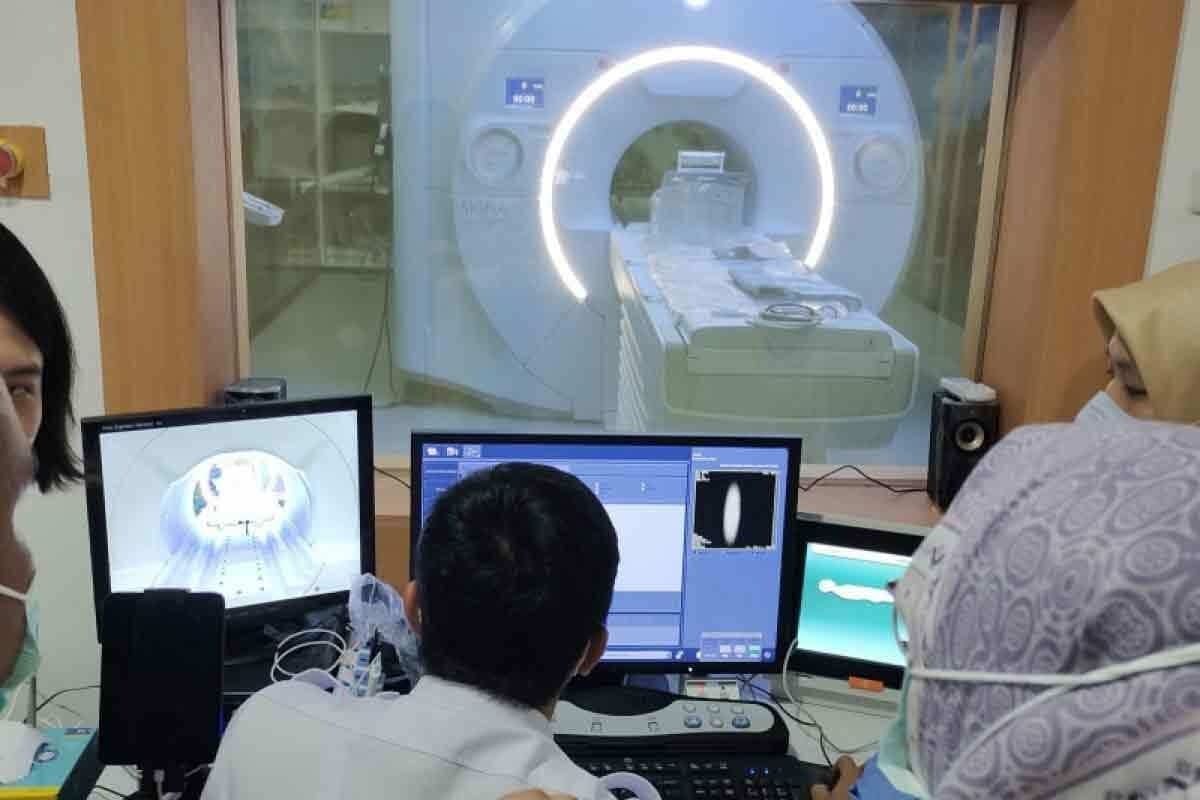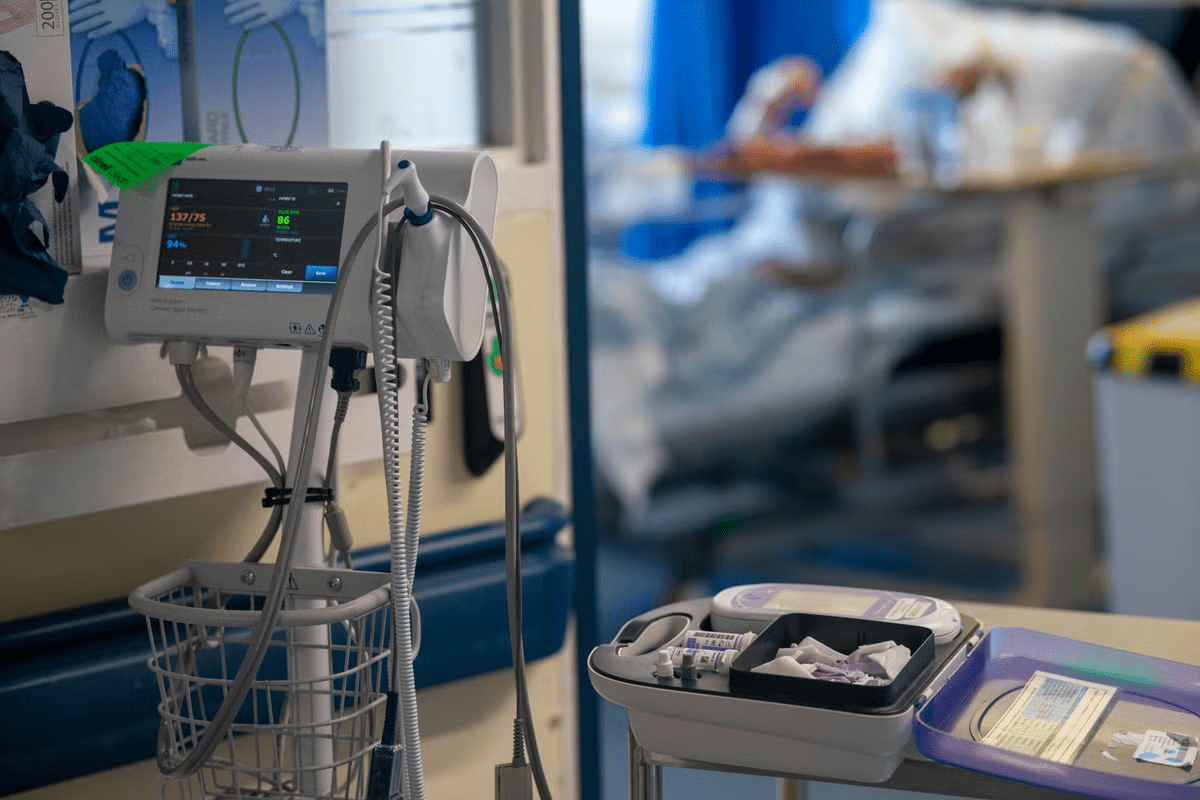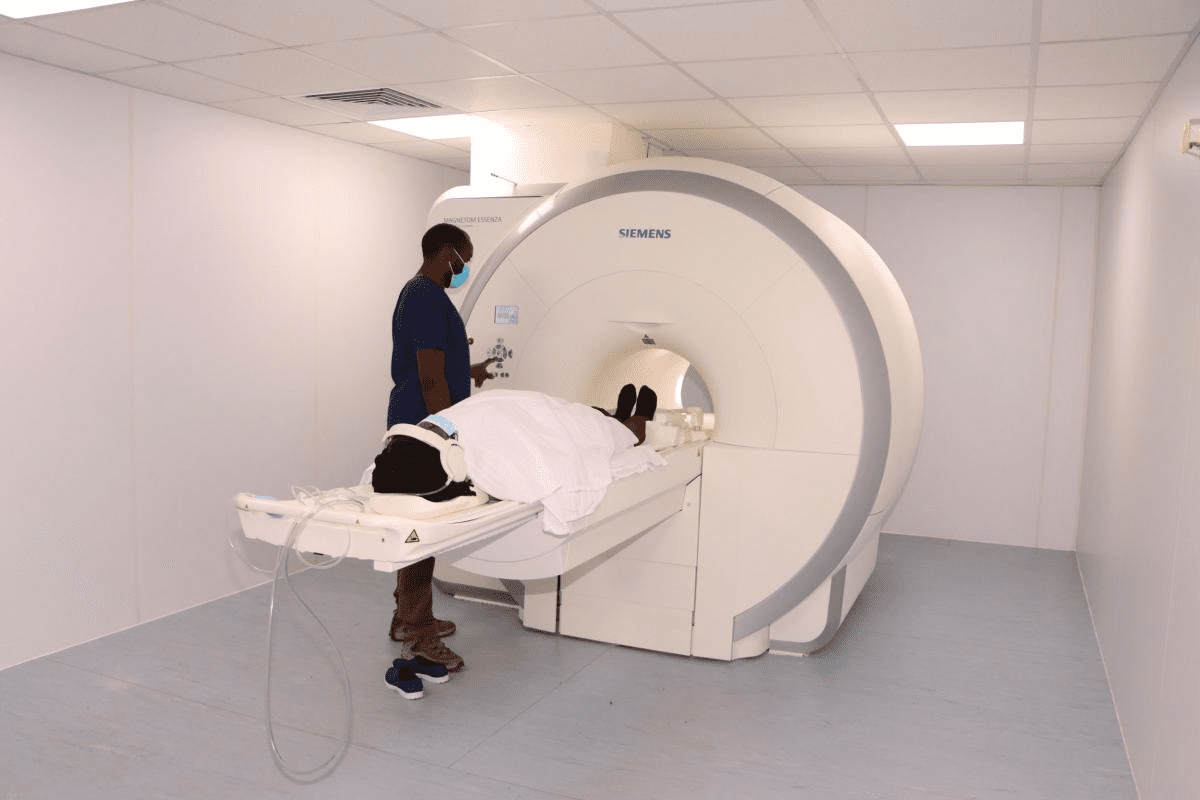Last Updated on November 26, 2025 by Bilal Hasdemir
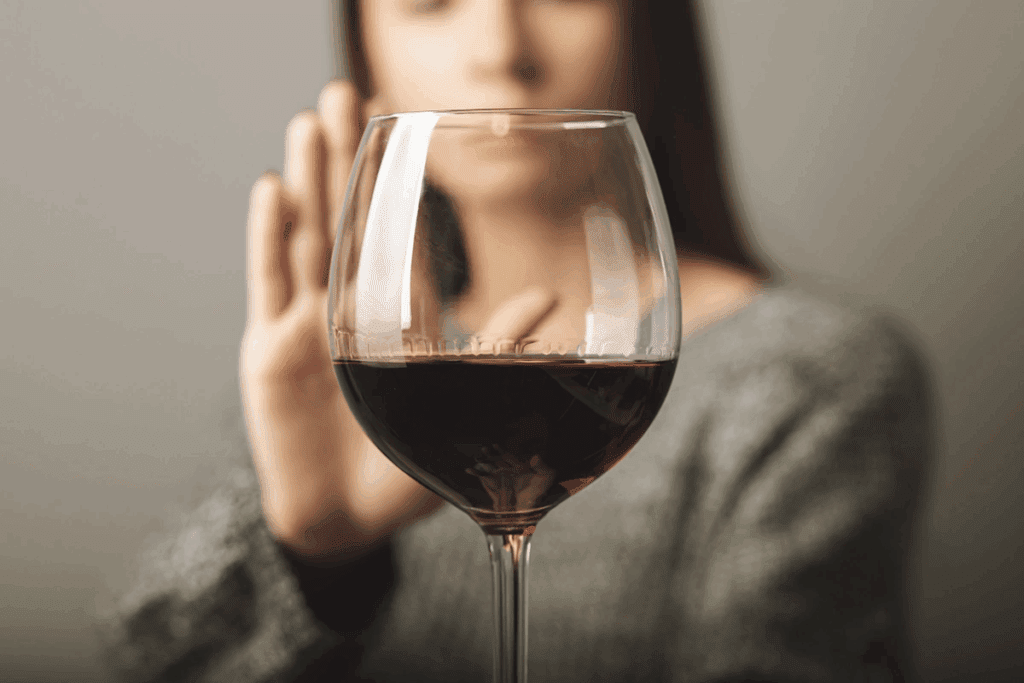
Chemotherapy diet restrictions
When you’re going through chemotherapy, it’s key to watch what you drink. This helps your treatment work better and keeps side effects down.
Some drinks can mess with cancer treatment, making side effects worse or lessening how well the treatment works. We’ll look at the drinks you should skip during this important time.
Knowing what to avoid in your diet is crucial. It helps you make smart choices about what to drink. This supports your cancer treatment diet plan and helps your health.
Key Takeaways
- Avoid certain beverages that can interact with chemotherapy.
- Be mindful of your fluid intake to minimize side effects.
- Understand the importance of a well-planned cancer treatment diet.
- Make informed decisions about your beverage choices during treatment.
- Support your overall health with appropriate dietary restrictions.
Understanding the Impact of Beverages During Cancer Treatment
It’s key to know how drinks affect chemotherapy. During treatment, the body reacts differently to various drinks. Knowing this helps in choosing the right drinks.
How Chemotherapy Affects Your Body’s Response to Drinks
Chemotherapy impacts not just cancer cells but the whole body. It changes how we process drinks. Some drinks can make side effects worse or interact with meds.
Common interactions include:
- Drinks that can worsen nausea
- Beverages that interact with chemotherapy medications
- Fluids that can cause dehydration
The Importance of Proper Hydration During Treatment
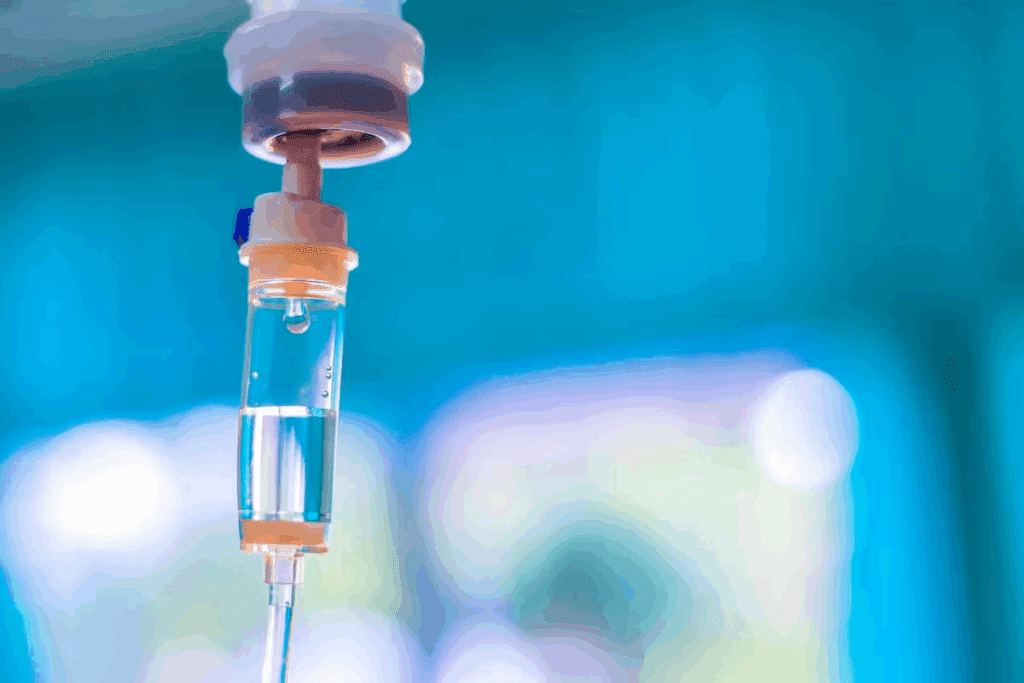
Staying hydrated is crucial during chemotherapy. It helps remove toxins and keeps the body healthy. But picking the right drink is important.
Optimal hydration choices include:
- Water
- Clear broths
- Electrolyte-rich beverages
| Beverage Type | Recommended | To Be Avoided |
| Water | Yes, essential for hydration | – |
| Caffeinated Drinks | In moderation | Excessive consumption |
| Sugary Drinks | No | Yes, cit an worsen side effects |
Choosing the right drinks during chemotherapy is key. Understanding how drinks affect the body helps patients make better choices. This supports their health and treatment success.
Alcohol and Chemotherapy: A Dangerous Combination
Drinking alcohol while on chemotherapy is risky. It can make it harder for the body to heal and fight the disease. Alcohol can also make treatment side effects worse.
Why Alcohol Should Be Avoided During Treatment
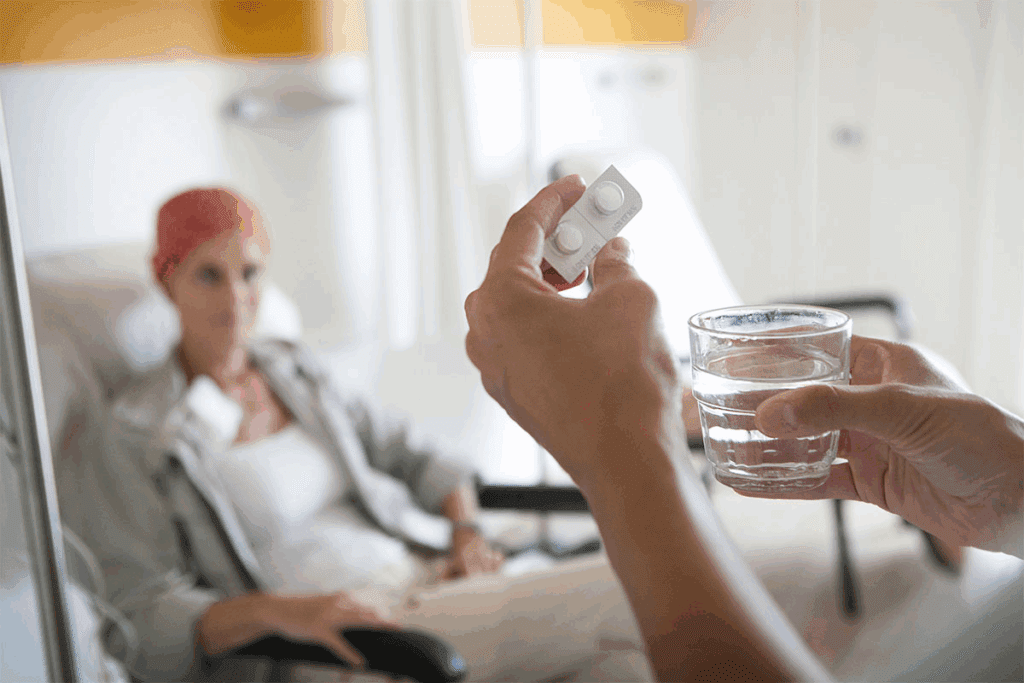
Alcohol can upset the stomach, making nausea and vomiting worse. It also dehydrates the body, making treatment harder.
Alcohol can also mess with the liver’s job of breaking down chemotherapy drugs. This can lead to more toxins in the body. It can make treatment less effective and harm the liver.
Key Risks of Alcohol Consumption During Chemotherapy:
- Increased risk of dehydration
- Enhanced toxicity due to impaired liver function
- Worsening of chemotherapy side effects
- Potential reduction in treatment efficacy
Effects of Alcohol on Medication Efficacy
Alcohol can change how the body handles chemotherapy drugs. It might make the drugs less effective or more toxic.
“The interaction between alcohol and chemotherapy drugs can lead to unpredictable and potentially dangerous outcomes,” Research shows.
A study found that drinking alcohol during chemotherapy made side effects worse. It also made treatment less successful than for those who didn’t drink.
| Effect | Description | Impact on Treatment |
| Metabolic Interference | Alcohol alters drug metabolism | Reduced efficacy or increased toxicity |
| Enhanced Side Effects | Alcohol exacerbates chemotherapy side effects | Worsening of the patient’s condition |
| Dehydration | Alcohol dehydrates the body | Complicates treatment and recovery |
Exceptions and Doctor Recommendations
While avoiding alcohol is usually advised, there might be exceptions. Doctors might suggest a small amount for certain patients or treatments.
Patients must talk to their doctors about drinking. Doctors can give advice based on the patient’s health and treatment type.
Knowing the risks of drinking during chemotherapy helps patients make better choices. Following the doctor’s advice supports treatment and health.
Caffeine Concerns: Coffee, Tea, and Other Caffeinated Beverages
Caffeine is a common stimulant that can impact patients on chemotherapy. It’s important to know how caffeine works with chemotherapy. This helps manage side effects and makes treatment more effective.
How Caffeine Affects Patients Undergoing Treatment
Caffeine can cause anxiety, jitteriness, and trouble sleeping in patients on chemotherapy. It can also change how some medicines work. It’s best for patients to talk to their doctors about caffeine.
Key considerations include:
- The amount of caffeine consumed daily
- The type of chemotherapy being administered
- Individual sensitivity to caffeine
Recommended Limits for Caffeine Consumption
Everyone reacts differently to caffeine. The American Academy of Sleep Medicine says adults should not have more than 400 milligrams of caffeine daily. That’s about three to four cups of coffee. During chemotherapy, it’s wise to drink less or avoid caffeine.
Decaffeinated Alternatives Worth Considering
If cutting down on caffeine is hard, decaf options are good. Decaf coffee and tea, and herbal teas, taste similar but don’t have caffeine’s risks during chemo. Patients should try these to control their caffeine intake.
Some popular decaffeinated options include:
- Decaffeinated coffee
- Herbal teas like peppermint or chamomile
- Caffeine-free versions of favorite teas
Green Tea and Cancer Treatment: Benefits vs. Risks
Green tea’s role in chemotherapy has sparked debate. It’s packed with antioxidants and may offer health benefits. But it can also interact with chemotherapy drugs in complex ways.
Potential Interactions Between Green Tea and Chemotherapy Drugs
Green tea has catechins that might affect chemotherapy drugs. For example, catechins can block enzymes needed for drug metabolism. This could make treatment less effective.
While green tea is usually safe, it’s wise to be cautious during chemotherapy. The antioxidants in green tea might also reduce the effects of chemotherapy drugs.
Research on Green Tea During Cancer Treatment
Studies on green tea and cancer treatment show mixed results. Some say green tea can boost chemotherapy’s effects. Others warn of possible negative interactions.
A study in a top cancer journal found that green tea catechins might help avoid some chemotherapy side effects. But more research is needed to understand its full impact.
Moderation Guidelines for Green Tea Consumption
For now, moderation is best when drinking green tea during chemotherapy. Patients should limit their green tea intake and talk to their doctor about safe amounts.
Most doctors recommend 2-3 cups of green tea a day. But this can change based on your health, chemotherapy type, and other factors.
It’s important for patients to talk openly with their healthcare team about green tea and diet. This way, they get advice that fits their treatment plan.
Grapefruit Juice and Other Citrus Interactions
The link between diet and chemotherapy is complex. Some foods and drinks can change how well treatment works. Grapefruit juice is one such item, known to affect some medications, including chemotherapy drugs.
Understanding Drug-Grapefruit Interactions
Grapefruit juice has compounds that block an enzyme called CYP3A4 in the small intestine. This enzyme breaks down many drugs, including some chemotherapy medicines. When grapefruit juice blocks this enzyme, it can make drug levels in the blood too high. This might increase the risk of side effects or toxicity.
Patients undergoing chemotherapy should be aware that not all drugs are affected by grapefruit juice. But, for some, the interaction is big. It’s key for patients to talk to their healthcare providers about safe foods during treatment.
Other Citrus Fruits to Be Cautious About
While grapefruit is well-known for its drug interactions, other citrus fruits like Seville oranges and pomelos can also affect drug metabolism. The compounds causing these interactions are not just in grapefruit. Patients should be careful with other citrus fruits and juices that might have similar compounds.
Timeframes for Avoiding Grapefruit Products
The time to avoid grapefruit products varies based on the chemotherapy plan and the patient’s health. Usually, doctors say to avoid grapefruit and its juice during treatment. Sometimes, they also advise avoiding it before starting chemotherapy to prevent any leftover effects.
It’s essential for patients to follow their healthcare provider’s advice on diet. This helps make treatment more effective and safer. By knowing and being careful about their diet, patients can help their care during chemotherapy.
Sugary Drinks and Their Effect on Cancer Treatment
Sugary drinks can make chemotherapy harder by adding a lot of sugar to the body. This can make treatment less effective. It’s important to watch what you eat during chemotherapy to help the treatment work better and reduce side effects. Drinks are a big part of this.
Impact of High Sugar Intake During Chemotherapy
Drinking too much sugar during chemotherapy can cause health problems. These include gaining weight, getting diabetes, and tooth decay. It can also weaken your immune system, making it harder to get better from chemotherapy.
Drinking sugary drinks can lead to eating more calories. This can cause weight gain and other health issues. This is especially bad during chemotherapy when your body is already stressed.
Common Sources of Hidden Sugars in Beverages
Many drinks have hidden sugars that can increase your sugar intake a lot. Flavored coffees, sweetened teas, sports drinks, and fruit juices are common culprits.
- Flavored coffees and lattes
- Sweetened teas and herbal infusions
- Sports drinks and energy drinks
- Fruit juices and sweetened milk
Healthier Sweetening Alternatives
If you can’t give up sugary drinks completely, there are better options. Natural sweeteners like stevia and honey can be used in small amounts.
| Natural Sweetener | Description | Usage |
| Stevia | A plant-based sweetener that is calorie-free | Use sparingly as it’s much sweeter than sugar |
| Honey | A natural sweetener with antimicrobial properties | Use in moderation due to its sugar content |
It’s very important to control sugar intake during chemotherapy. Knowing where hidden sugars come from and choosing better sweeteners can help support your treatment.
Energy Drinks: Why They’re Particularly Problematic
Drinking energy drinks during chemotherapy is risky. They can mix badly with medications and make side effects worse. Energy drinks have caffeine, taurine, guarana, and B vitamins. These can harm chemotherapy patients’ health.
Dangerous Ingredients in Energy Drinks for Chemo Patients
Energy drinks have ingredients that can harm during chemotherapy. Caffeine can make insomnia, anxiety, and heart problems worse. Taurine and guarana can also mess with chemotherapy drugs, making them less effective or more toxic.
Some energy drinks have too many B vitamins. While safe usually, too much can cause problems during chemotherapy. The sugar in many energy drinks can also lead to weight gain, metabolic issues, and diabetes risk.
Risks of Combining Energy Drinks with Medications
Drinking energy drinks with chemotherapy meds can cause bad reactions. Caffeine can change how some drugs work. Other ingredients can make chemotherapy side effects like nausea and fatigue worse.
Patients getting chemotherapy should know these risks. They should talk to their doctor before drinking energy drinks or supplements. This helps avoid complications and improves treatment outcomes.
Carbonated Beverages: Soda and Sparkling Water Considerations
Chemotherapy patients often wonder about the safety of carbonated drinks like soda and sparkling water. It’s important to be careful about what we drink during treatment to manage side effects.
Digestive Symptoms and Carbonation
Drinks with carbonation can cause bloating, gas, and discomfort. This can be worse for people getting chemotherapy. The carbonation adds carbon dioxide gas, which can cause these problems.
Some people might get diarrhea or constipation from these drinks. It’s important to watch how your body reacts to these drinks and adjust your intake as needed.
Differences Between Sodas and Sparkling Waters
Not all carbonated drinks are the same. Sodas have a lot of sugar and can have artificial stuff that’s bad for chemotherapy patients. Sparkling water, on the other hand, is usually better if it doesn’t have added flavors or sweeteners.
- Sparkling water can be a good choice for those who don’t like plain water.
- But some flavored sparkling waters might have citric acid or natural flavors that can upset your stomach.
- Sodas, especially those with caffeine, can make you dehydrated if you don’t drink enough plain water.
When picking between sodas and sparkling waters, always read the labels. Choose drinks that are less likely to upset your stomach or interfere with your treatment.
Raw and Unpasteurized Juices: Understanding the Infection Risk
Raw and unpasteurized juices can be risky for people with cancer. When you’re getting chemotherapy, your immune system is weaker. This makes you more likely to get sick from these juices.
Bacterial Concerns in Unpasteurized Beverages
Unpasteurized juices might have harmful bacteria like Salmonella, E. coli, and Listeria. These can lead to serious foodborne illnesses. For people with weak immune systems, this is especially dangerous. The FDA has found links between unpasteurized juices and foodborne illness outbreaks.
“The risk of infection from consuming unpasteurized juice is significant for chemotherapy patients,” says a leading oncologist. “It’s crucial for patients to be aware of the sources of their juice and to take necessary precautions.”
Safe Juice Preparation Methods
To lower the risk of getting sick, it’s key to use safe juice-making methods. Pasteurization kills harmful bacteria. Juice makers use methods like high-pressure processing (HPP) and thermal pasteurization. You can also make juice safely at home by using clean tools and washing fruits and veggies well.
- Always wash your hands before handling fruits and vegetables.
- Use clean and sanitized equipment for juicing.
- Thoroughly wash fruits and vegetables before juicing.
- Consider using pasteurized juices or pasteurizing your juice at home.
Store-Bought vs. Homemade Considerations
Choosing between store-bought and homemade juices involves some thinking. Store-bought juices are often pasteurized, which lowers the risk of bacteria. But make sure to check the label for pasteurization info. Homemade juices can be safer if made right, but there’s a risk of contamination if you don’t follow good hygiene.
We suggest that chemotherapy patients choose pasteurized juices or make sure their homemade juices are made with strict hygiene. Always talk to your healthcare provider for advice on what to eat during cancer treatment.
Herbal Teas and Supplements in Liquid Form
The world of herbal teas and liquid supplements is vast. But for those undergoing chemotherapy, it’s a landscape that requires careful navigation. Patients seeking to complement their treatment with these beverages must understand their potential interactions with chemotherapy.
Potentially Harmful Herbal Interactions
Certain herbal teas and supplements can interfere with chemotherapy drugs. They might enhance their effects in harmful ways or reduce their efficacy. For example, St. John’s Wort can interact with many medications, including some chemotherapy drugs. It can accelerate their metabolism and potentially reduce their effectiveness.
Examples of Herbal Teas to Approach with Caution:
- Ginkgo biloba
- Garlic supplements
- Green tea, when consumed in large quantities
Safe Herbal Tea Options During Treatment
While caution is advised, some herbal teas are generally safe during chemotherapy. They should be consumed in moderation. Peppermint tea, for example, can help alleviate nausea, a common side effect of chemotherapy.
Recommended Herbal Teas:
- Peppermint tea
- Ginger tea
- Chamomile tea
Consulting Healthcare Providers About Herbal Products
Before incorporating any herbal teas or supplements into their regimen, patients should consult with their healthcare providers. This ensures that any potential risks are identified and managed.
“It’s essential for patients to keep their healthcare team informed about any herbal teas or supplements they’re using or planning to use,” says an oncologist. “This allows us to provide guidance on safe choices and avoid potential interactions.”
By being mindful of the herbal teas and supplements they consume, patients can make informed decisions. These decisions support their overall treatment plan and help manage side effects.
Comprehensive Chemotherapy Diet Restrictions
During chemotherapy, a well-planned diet is key. It includes choosing the right drinks. This can greatly affect how patients feel and respond to treatment. A detailed diet plan is important to reduce side effects and keep health up.
Beverage Guidelines as Part of Overall Dietary Protocol
Choosing drinks wisely is crucial during chemotherapy. Some drinks can affect medications or worsen side effects. Others can help with hydration and nutrients. It’s important for patients to pick drinks that are safe and helpful during treatment.
Patients should talk to their healthcare team about their drink choices. This will help create a personalized plan. The plan will consider the chemotherapy, nutritional needs, and health conditions.
Working with Oncology Nutritionists
Oncology nutritionists are key for patients with chemotherapy. They help with dietary restrictions and create a personalized eating plan. These experts provide guidance on the best nutrition during cancer treatment.
With an oncology nutritionist, patients learn to manage side effects through diet. They also get advice on foods and drinks that support health during chemotherapy.
Personalized Approaches to Dietary Restrictions
Every patient’s experience with chemotherapy is different. Dietary needs vary greatly from person to person. It’s important to consider the type of cancer, chemotherapy, and health status when planning a diet.
| Dietary Consideration | General Recommendation | Personalized Approach |
| Beverage Choices | Focus on hydrating beverages like water and clear broths | Consider individual tolerance to caffeinated or carbonated drinks |
| Nutrition Needs | Emphasize nutrient-rich foods and beverages | Adjust based on specific nutritional deficiencies or needs |
| Side Effect Management | Use dietary adjustments to manage common side effects | Tailor strategies to individual side effect profiles |
By taking a detailed and personalized approach to diet during chemotherapy, patients can manage their treatment better. This improves their quality of life.
Recommended Beverages During Chemotherapy
The right drinks can make a big difference in managing chemotherapy side effects. It’s important to choose drinks that hydrate and provide nutrients. They should also help ease discomfort.
Optimal Hydration Choices
Staying hydrated is key during chemotherapy. Drinking plenty of water is the best choice. Try to drink at least eight glasses a day. If you’re feeling sick or have diarrhea, drink more.
Other good choices for staying hydrated include:
- Herbal teas, such as peppermint or ginger tea, can be soothing
- Clear broths, like chicken or vegetable broth, for added electrolytes
- Electrolyte-rich beverages, such as coconut water or sports drinks, to help maintain the body’s electrolyte balance
Nutrient-Rich Drink Options
Drinks rich in nutrients are also important during chemotherapy. Consider:
- Nutrition shakes or smoothies made with fruits, vegetables, and protein powder
- Fortified milk or plant-based milk alternatives to boost calorie and protein intake
- Juices made from nutrient-dense fruits and vegetables, such as orange or beet juice
These drinks help ensure you get the nutrients you need. They support your strength and treatment.
Beverages That Help Manage Side Effects
Certain drinks can help with common chemotherapy side effects. For example:
- Ginger tea or ginger ale can help soothe nausea
- Cold or frozen drinks, like popsicles or cold water, can be comforting if you have mouth sores or difficulty swallowing.
- Probiotic-rich drinks, such as kefir or probiotic-infused water, may help manage digestive issues.
It’s important to try different drinks to find what works best for you during treatment.
Managing Treatment Side Effects Through Smart Beverage Choices
Choosing the right drinks can help ease common side effects of chemotherapy. The right drinks can make symptoms better, improve comfort, and help with overall health during treatment.
Addressing Nausea and Vomiting
Nausea and vomiting are tough side effects of chemotherapy. Some drinks can help make these symptoms better. Clear liquids like broth, electrolyte-rich drinks, and ginger tea are good choices.
Ginger ale or ginger tea can be very soothing. This is because ginger has natural anti-inflammatory properties.
“Ginger has been shown to be effective in reducing nausea in cancer patients,” according to some studies. It’s important to choose ginger products that are not too sweet or carbonated. These can make nausea worse.
Combating Dry Mouth and Taste Changes
Dry mouth and taste changes are common during chemotherapy. Drinking the right beverages can help. Drinking water or sucking on ice chips can help with dry mouth.
For taste changes, trying different flavors or temperatures can help find what works best.
- Try herbal teas like peppermint or chamomile for a soothing effect.
- Experiment with cold or room-temperature beverages if hot drinks are unappealing.
- Use a humidifier at night to help keep the mouth moist.
Dealing with Swallowing Difficulties
Some chemotherapy patients have trouble swallowing. This can be due to mouth sores or dryness. Choosing drinks with the right consistency is important.
Smooth, creamy drinks like yogurt or nutritional supplements are easier to swallow.
For those struggling with swallowing, it’s advisable to:
- Avoid very hot or very cold drinks, as they can cause discomfort.
- Opt for thickened liquids if recommended by a healthcare provider.
- Take small sips and pause frequently to avoid overwhelming the mouth and throat.
Creating a Personalized Beverage Plan During Cancer Treatment
Creating a customized beverage plan can help with chemotherapy side effects. Everyone reacts differently to treatment. So, it’s key to choose drinks that fit your needs.
Tracking Reactions to Different Drinks
It’s important to watch how your body reacts to different drinks. Keep a log of what you drink and any side effects. This helps find out which drinks are best or worst for you.
If a drink makes you feel sick or dehydrated, cut back on it. Making smart choices about what you drink is crucial.
Adjusting Intake Based on Treatment Cycles
Chemotherapy cycles change your body’s needs and how it handles drinks. Be careful about what you drink during and after treatment.
On treatment days, stick to hydrating drinks that are easy on your stomach. On other days, you might be able to drink more. Changing your drink choices with your treatment cycle can help manage side effects.
Communicating with Your Healthcare Team
Talking openly with your healthcare team about your drink choices is important. They can give you advice and adjust your treatment plan based on what you say.
As one expert says, “Knowing what drinks a patient likes and can handle is key to good care.” Talk to your oncologist or a nutritionist for advice that fits your needs.
“The key to managing side effects lies in understanding the individual’s response to different beverages and adjusting their intake accordingly.”
An Oncologist
Conclusion: Navigating Beverage Choices for Better Treatment Outcomes
Choosing the right drinks during chemotherapy is key to lessening side effects and better treatment results. Knowing which drinks to avoid and which are good can help patients make smart choices. A detailed chemotherapy diet restrictions guide can keep them on the right path.
A cancer treatment diet plan with the right drinks can help manage side effects. We suggest picking drinks rich in nutrients and avoiding those that might harm chemotherapy drugs. This way, patients can handle their symptoms better and live a fuller life.
Working with healthcare providers and following chemotherapy and nutrition tips can help create a personalized drink plan. This plan ensures patients stay hydrated, manage side effects, and keep their health up during treatment.
FAQ
What beverages should be avoided during chemotherapy?
Avoid alcohol, too many caffeinated drinks, grapefruit juice, sugary drinks, energy drinks, and raw juices. They might interact with your treatment or increase infection risk.
Can I drink green tea while undergoing chemotherapy?
You can have green tea in small amounts during chemotherapy. But be careful of possible drug interactions. Always talk to your doctor first.
How does caffeine affect chemotherapy patients?
Caffeine can make side effects like insomnia, anxiety, and dehydration worse. Try to limit it and choose decaf options instead.
Are there any safe herbal teas for patients undergoing chemotherapy?
Some herbal teas are okay, but others might not be. Always check with your doctor before trying any new teas or supplements.
What are the risks associated with consuming energy drinks during chemotherapy?
Energy drinks can be risky for those on chemotherapy. They might interact with your meds or make side effects worse. It’s best to avoid them.
Can carbonated beverages like soda and sparkling water be consumed during chemotherapy?
Drinks like soda and sparkling water can upset your stomach during treatment. Sparkling water is safer, but watch your body’s reaction.
How can I manage nausea and vomiting through beverage choices during chemotherapy?
Drink clear fluids, electrolyte drinks, or ginger-based drinks to help with nausea and vomiting. Try different things to see what works for you.
Why is it important to avoid grapefruit juice during chemotherapy?
Grapefruit juice can mess with some chemotherapy drugs. It might make them less effective or increase side effects. Your doctor will tell you to avoid it.
How can I create a personalized beverage plan during cancer treatment?
Keep track of how you react to different drinks. Adjust your choices based on your treatment. Talk to your healthcare team for the best plan.
Are there any nutrient-rich drink options that are beneficial during chemotherapy?
Yes, smoothies with fruits, veggies, and protein are good. Also, nutritional supplements your doctor recommends can help during treatment.
How can beverage choices help manage dry mouth and taste changes during chemotherapy?
Drinking water or electrolyte drinks can help with dry mouth. Try different flavors or temperatures to find drinks you like.
References
Conigliaro, T., Grosso, F., Baiocchi, G. L., et al. (2020). Food intake during cancer therapy: a systematic review. PMC. https://www.ncbi.nlm.nih.gov/pmc/articles/PMC7584741/


